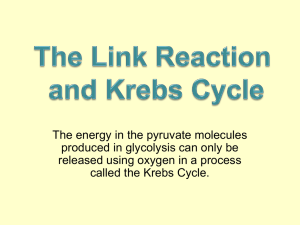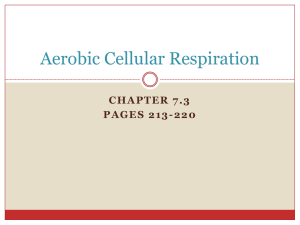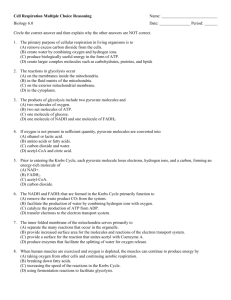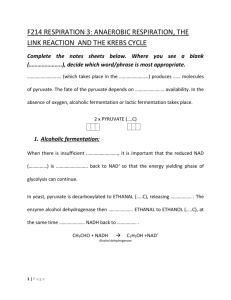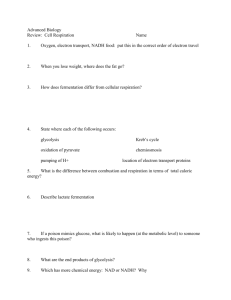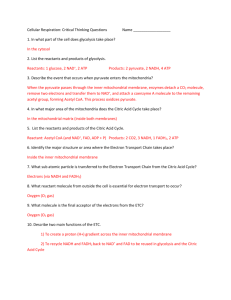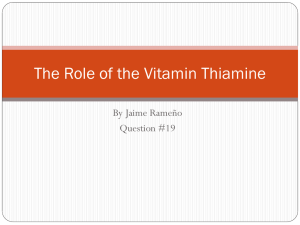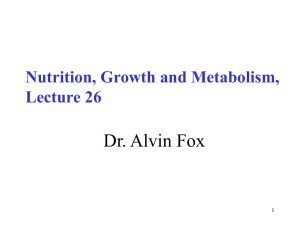Pyruvate Oxidation and the Krebs Cycle
advertisement
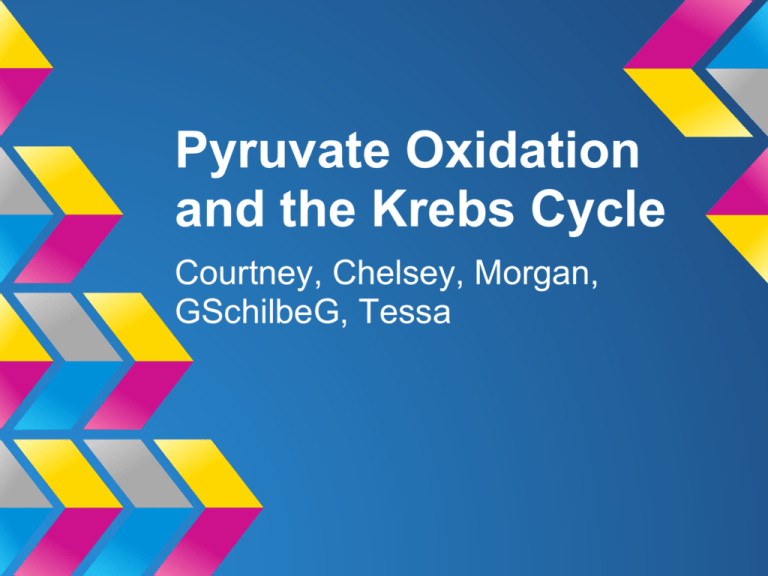
Pyruvate Oxidation and the Krebs Cycle Courtney, Chelsey, Morgan, GSchilbeG, Tessa Pyruvate Oxidation Pyruvate Oxidation ● Pyruvate is a glucose molecule cut in half ● Pyruvate oxidation is the second stage of cellular respiration ● One step process occurring in mitochondrial matrix ● This is the end product of glycolysis Pyruvate Oxidation (cont.) ● Can be derived from lactate taken up from the environment or multicellular organisms from other cells ● Produced from a variety of amino acids ● Can be converted to acetyl coenzyme A ● This conversion is irreversible ● There are three changes to pyruvate The Changes 1. A CO2 portion is removed 2. NAD+ is reduced by two Hydrogen atoms obtained from food 3. Coenzyme A is attached to the remaining acetic acid portion Activation The pyruvate oxidation process starts off because a multienzyme complex catalyzes the following three changes. Reactants and Products Equation: 2 pyruvate + 2 NAD+ + 2 CoA -> 2 acetyl-CoA + 2 NADH + 2 H+ +2 CO2 Reactants: 2 pyruvate, 2 NAD+, 2 CoA Products: 2 acetyl-CoA, 2 NADH, 2 H+, 2 CO2 Converts Pyruvate/ pyruvic acid into Acetyl-CoA Which takes places two times for every glucose molecule Acetyl - CoA ● Used for lipid synthesis, animals cannot use to synthesize amino acids or carbohydrates ● This means that this conversion is an important step ● Removes the fully oxidized carbon while extracting some energy ● Prepares molecule for the remaining process Reactions of the Pyruvate Dehydrogenase Complex ● First step: an oxidative decarboxylation reaction ● This is carried out by a very large enzyme complex called the pyruvate dehydrogenase complex (located in the mitochondrial matrix) ● This is irreversible and tightly regulated Pyruvate Dehydrogenase: 2 pyruvate + 2 NAD+ + 2 CoA 2 acetyl-CoA + 2 NADH + 2 H+ +2 CO2 The Krebs Cycle ● step 3 in cellular respiration ● 8 step, cyclic process ● each step is catalyzed by a specific enzyme ● overall chemical equation for Krebs cycle oxaloacetate + acetyl-CoA + ADP + Pi + 3NAD+ + FAD CoA + ATP + 3NADH + 3H + + FADH2 + 2CO2 + oxaloacetate The Krebs Cycle Diagram Page 102 Krebs Cycle Steps ● step 1: Acetic acid subunit of acetyl CoA is combined with oxaloacetate to form molecule of citrate ● step 2:Citrate(6-C) is rearranged to isocitrate(6-C). ● step 3:Isocitrate (6-C) is converted to -ketoglutarate (5C) by losing a CO2 and two hydrogen atoms that reduce NAD+to NADH. ● step 4:-ketoglutarate (5-C) is converted to succinyl-CoA (4-C). A CO2 is removed, coenzyme A is added, and two hydrogen atoms reduce NAD+ to NADH. Krebs Cycle Steps ● step 5:Succinyl CoA(4-C) is converted to succinate (4C). ATP is formed by substrate level phosphorylation, and coenzyme A is released. ● step 6: Succinate (4-C) is converted to fumarate (4-C). Two hydrogen atoms reduce FAD to FADH2. ● step 7: Fumarate (4-C) is converted to malate (4-C). ● step 8: Malate (4-C) is converted to oxaloacetate (4-C). Two hydrogen atoms reduce NAD+ to NADH. Krebs Cycle ● original glucose molecule is entirely consumed ● 6 carbon atoms leave process as 6 low-energy CO2 molecules, which are disposed of as waste ● original glucose molecule reduced to energy: ○ 4 ATP molecules 2 from glycolysis 2 from Krebs cycle ○ 12 reduced coenzymes 2 NADH from glycolysis 2 NADH from pyruvate oxidation 6 NADH from Krebs cycle 2 FADH2 from Krebs cycle Reactants and Products oxaloacetate + acetyl-CoA + ADP + Pi 3NAD+ + FAD CoA + ATP + 3NADH + 3H+ FADH2 + 2CO2 + oxaloacetate Reactants: Acetyl Co-A, oxaloacetate, Citrate, Alpha ketoglutarate Products: 6 NADH + H+, 2 FADH2, Carbon Dioxide, ATP Krebs Cycle Simplified Activation ● The Krebs cycle has to be carefully monitored to remain efficient ● Too fast: energy would be wasted producing ATP and reduced coenzymes ● Too slow: not enough energy released to support cell function Activation Methods ● The Krebs cycle requires the products of pyruvate oxidation to start, so its rate can't surpass that stage's (substrate availability) ● Feedback inhibition is used for different stages ○ NADH inhibits citrate synthase, isocitrate dehydrogenase and αketoglutarate dehydrogenase ○ succinyl-CoA competes with acetyl-CoA and inhibits α-ketoglutarate dehydrogenase Aerobic or Anaerobic ● Neither process uses O2 to function ● Both are still aerobic because their products (NADH and FADH2) move to the ETC which eventually uses O2(aerobic) Sources ● ● ● ● ● ● ● http://www.incolor.com/mcanaday/Krebs%20Phases.htm http://wiki.pingry.org/u/ap-biology/index.php/Pyruvate_Oxidation_% 26_The_Citric_Acid_Cycle http://course1.winona.edu/sberg/241f00/Lec-note/Respira.htm http://www.livestrong.com/article/406081-why-is-the-krebs-cycle-anaerobic-process/ http://www.tamu.edu/faculty/bmiles/lectures/regulationtca.pdf http://biochem.siu. edu/bmb_courses/mbmb451b/lectures/mbmb451b_tcacycle.pdf Nelson Biology 12, Chapter 2 Quiz 1. Pyruvate oxidation occurs in which of the following locations? (a) cytoplasm (b) mitochondrial matrix (c) inner mitochondrial membrane Quiz 2. True or false CoA stands for Coenzyme A? Answer: True Quiz 3. How many pyruvate molecules does one glucose molecule yield after pyruvate oxidation? Two Answer: Quiz 4. What compound is both a reactant and a product in the Krebs cycle that makes it cyclic? Answer: oxaloacetate Quiz 5. Would you consider pyruvate oxidation aerobic or anaerobic? Answer: aerobic Quiz 6. What are all of glucose's carbons eventually released as during both processes? Answer: CO2 Quiz 7. How many ATP are produced from the Krebs cycle? Answer: 2 Quiz 8. Why is it important that the Krebs cycle doesn't proceed too slowly? Answer: Not enough energy would be released to support cell function
